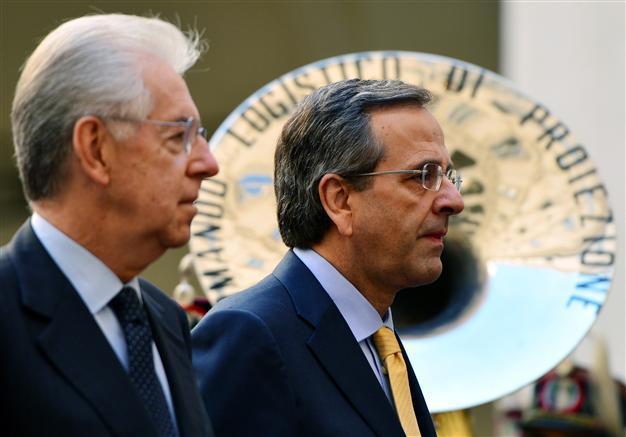Eurozone meets to launch rescue fund as Greece,Spain struggle
LUXEMBOURG - Agence France-Presse

Greece's Prime minister Antonis Samaras (R) stands next to Italian Prime Minister Mario Monti upon arrival at Chigi Palace in Rome on September 21, 2012. Samaras and Monti will attend talks on the economic situation in the Eurozone and the new austerity package. AFP PHOTO / GABRIEL BOUYS
The eurozone launches its much-awaited 500-billion-euro rescue fund on Monday, a positive backdrop for finance ministers trying to settle Greece's tortuous debt bailout and as Spain agonises over seeking a rescue.Finance ministers of the 17-nation euro bloc gather just 10 days before the EU's 27 leaders meet in Brussels, with recent market calm giving them some breathing room after months of turmoil and anxiety over Spain's future.
The meeting will see the formal launch and inaugural board meeting of the European Stability Mechanism, a key step forward in the eurozone's defences against the debt crisis which has help push the bloc back into recession.
At the same time, the economic landscape is not encouraging, with recent data showing Europe back in recession and threatening to slip further into the doldrums.
EU officials said on Friday that they do not expect Greece to get the green light, either in Luxembourg or at the October 18-19 Brussels summit, for the resumption of its drip-feed bailout after differences with its EU, European Central Bank and International Monetary Fund creditors.
The EU, IMF and ECB, the so-called "troika", have been locked in discussions on more austerity with Greece which insists it has done as much as it can and now needs more time to meet the targets required.
Greek Prime Minister Antonis Samaras said on Friday that the country could not take more tough medicine and if its next aid instalment worth 31.5 billion euros ($40.6 billion) did not arrive soon, then by November state coffers would be empty.
German Chancellor Angela Merkel is due in Greece on Tuesday and her visit may allow some easing of the tensions which have built up but the October summit comes "considerably too early" to resolve the problems, a senior EU official said on Friday.
The position has become more complicated after eurozone hardliners Germany, the Netherlands and Finland questioned commitments made at a June EU summit, which notably agreed that the ESM would be able to recapitalise banks directly once a single banking supervisor was in place, potentially by the end of the year.
The three said the ESM should not be used to help banks bailed out before it became operational -- a stand on 'legacy assets' which must have been "very unwelcome" for Spain and bailed-out Ireland, another EU official said.
In the run-up to the eurozone and EU finance ministers' meeting in Luxembourg on Monday and Tuesday, Spain has been in the spotlight over whether or not it would ask for a bailout, thereby activating the ESM and action by the ECB.
The ECB has said it will intervene, buying up government bonds to bring down their borrowing costs but only if a member state first asks the ESM for help -- which will also come with conditions for reforms.
Spanish Economy Minister Luis de Guindos said on Thursday that Madrid did "not need a bailout at all" and insisted that the government's tough austerity policies were putting the country on the right track.
Official briefings on Friday all suggested that finance ministers did not expect any imminent developments on Spain as Madrid's latest austerity package showed the country was "going in right direction." At the same time, the recent easing of strains on the financial markets, in part due to the ECB's stance, mean "market conditions are totally distant from any need for a full, macro-economic adjustment programme," one official said.
















